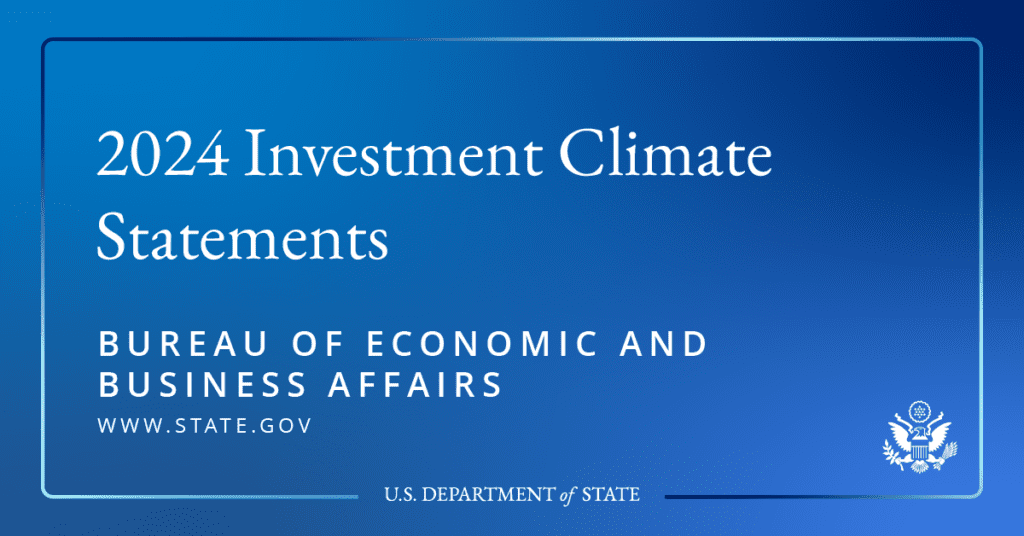Bangladesh’s 170 million population has a large and young workforce but the country’s comparative advantage in cheap labor for manufacturing is partially offset by lower productivity due to poor skills development, inefficient management, pervasive corruption, and inadequate infrastructure.
The informal economy is about 30 percent of the total economy. The official total unemployment rate in 2023 was 3.53 percent, female unemployment rate was 3.59 percent, and youth unemployment (ages 15-29) was 8 percent, according to the Bangladesh Bureau of Statistics.
The Bangladesh Labor Act (BLA) specifies compensation for injured workers, employment conditions, freedom of association, health and sanitary conditions, leave policies, minimum wage setting procedures, right to join unions, and working hours. But in practice, the Government does not consistently and effectively enforce labor laws and independent trade face persistent barriers to registration and lack of protection against unfair labor practices and anti-union discrimination. Charges for unfair labor practices are rarely brought against employers for violating labor rights, but workers in unions have been subjected to police violence, mass dismissals, and arrests of union leaders for asserting their rights to protest, according to labor rights groups.
Companies discouraged and prevented the formation of independent worker-led labor unions, preferring pro-factory management unions. Labor organizations reported most workers experienced violence, harassment, unfair labor practices, and anti-union discrimination if they attempted to form or register independent unions. The Government reports over 1,000 registered trade unions, but labor leaders estimated less than 200 active trade unions are in the RMG sector and less than 40 unions have entered into collective bargaining agreements.
The Export Processing Zones (EPZ) Labor Act bans trade unions and heavily restricts activities in the zones; this affects nearly 450,000 EPZ workers. The EPZ labor law only permits “worker welfare associations” – a weaker alternative to trade unions that do not have the right to organize or bargain collectively.
BEPZA has the discretion to ban any strike viewed as prejudicial to the public interest. BEPZA maintains the authority to conduct labor inspections and gives the Department of Inspections for Factories and Establishments (DIFE) the authority to conduct joint inspections.
Bangladesh’s minimum wage review is held every five years and coincides with the general elections. In 2023, protests flared across Dhaka’s industrial areas following a decision by the wage board to increase the RMG minimum wage to 12,500 taka (USD 112), in contrast to labor groups demand of BDT 23,000 taka (USD 209). Police and security forces used rubber bullets, tear gas, and water cannons to suppress demonstrations, leaving hundreds injured, many critically. Police brought criminal charges against several labor organizers and workers for engaging in wage-related protests. Bangladesh last increased the RMG monthly minimum wage in 2018 to BDT 8,000 taka (USD 75).
The BLA differentiates between layoffs and terminations; no severance is paid if a worker is fired for misconduct. However, in the case of downsizing or “retrenchment,” the law requires factories and establishments to notify DIFE one week prior to temporarily laying off workers. However, media and trade unions report that employers not only fail to pay workers their severance or benefits, but also their regular wages. In 2021 alone, workers and organizers staged 172 labor protests in the garment sector over back wages, factory layoffs, and demands to reopen closed factories.
In January 2023, Parliament passed the Universal Pension Management Act to provide a social security system for private sector employees. Employees aged between 18 and 50 will pay a premium for at least 10 years and can start collecting their pensions at age 60. A National Pension Authority will be created to roll out the pension scheme.
The United States suspended Bangladesh’s access to the U.S. Generalized System of Preferences (GSP) after two industrial accidents killed over 1,250 garment workers – the Tazreen Fashions fire in 2012 and the Rana Plaza collapse in 2013. Since then, Bangladesh has improved the garment industry’s fire and structural safety issues and has taken some steps to become more compliant with international labor standards. The United States funds projects to improve the RMG sector’s occupational safety, health, and labor rights, working with international partners, civil society, businesses, and the Bangladesh Government. The United States works with other governments and the International Labor Organization (ILO) to assist Bangladesh with additional labor reforms needed to fully comply with international labor conventions. The U.S. Government is closely monitoring necessary legal reforms and implementation as required under the 2021 ILO Roadmap to ensure the labor law and practices come into compliance with international labor standards.

